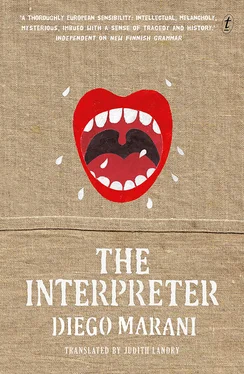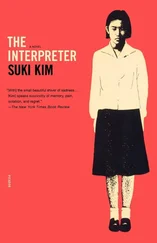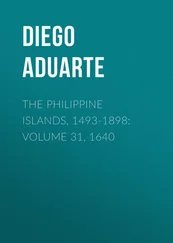When at last the spasms abated, I stood there in silence, listening to the sound of rain dripping onto sheet metal, to the rustle of plastic sheeting shifting in the wind. Aching in every limb, I made my way to the edge of the landing and peered cautiously over the edge, to see a black shape spread-eagled on its back amidst shards of broken glass, speared on the aluminium shafts, the rain gradually diluting the bright sticky stain which was spreading over the floor around him.
I teetered back into the room, closed the door and warmed myself up in front of the stove for a bit before cleaning myself up as best I could with the freezing water from the washbasin. Matters were not improved by the fact that I had cut both feet by walking on broken glass; I dabbed them with disinfectant and bound them up with gauze which I’d found in the cabinet. I picked up my clothes from the corner where I had thrown them — they were filthy, and damp, but I had nothing else I could put on. I picked up my empty wallet and Tibor Preda’s passport and put them into Radu’s rucksack; I also found the printed list I’d removed from Stauber’s pocket; unsurprisingly, it was now somewhat the worse for wear. I took Radu’s jacket down from the hook — it stank appallingly of sweat and dirt; rummaging around in the pockets, I found some car keys and the pistol, together with a bundle of banknotes, done up in a plastic band. I counted them out. Three thousand dollars — now I knew what I was worth, though the other half was yet to come. I took the handcuffs off the bedhead and put them too into the rucksack. Suddenly the mobile rang, making me jump; I searched for it frantically in my inner pocket, then clutched it in my still trembling hand, watching it ring, feeling as though the unknown controller of my destiny were calling me from the other side, reproaching me, because that move had not been foreseen, and would be paid for dearly; warning me that, however I might struggle, however many Radus I might kill, I would not get away. In those moments of confusion, dazed and relieved as I was by my unexpected escape, the one thing I felt clearly was a sense that I was no longer the person I had once been; at some moment to which I could not return, leaving my being unguarded, I had accidentally departed from it. Having moved on from my old self, I could now look upon it, empty, untenanted, an easy prey to others’ whims. I felt that the ringing of the telephone had indeed been a warning, that soon I too would become a whistling man who would go to die in the convent in Odessa; on the one hand I had no way out, on the other I could afford the unheard-of luxury of playing with a life that was no longer my own. Spotting some bottles of aspirin on a shelf, I stuffed them into my pockets. It was now dark outside. I put on the fur cap, took down a torch that was hanging on the back of the door and made my way cautiously downstairs. Keeping my distance, I shone the light in the direction of Radu’s body where it lay in the dirt: he was still alive, one banister support protruding from his stomach. He was breathing unevenly, and blood was trickling from his mouth; his eyes were open, his expression almost resigned. Dazzled by the torchlight, he blinked; he seemed to be patiently waiting to die. Shivering with horror, I ran into the open, setting off an ominous clanging as I stumbled through scrap metal and tin cans, to find myself in a field furrowed with tyre marks. A thick mist was swirling over the grass, forming eerie configurations. Some distance away, I caught sight of the black car into which I had been unceremoniously bundled who knows how long ago. I got in and turned on the ignition; the lights lit up a gravel road. The engine sputtered for a bit, then the car sprang into motion with a throaty roar.
It was very dark. The road unrolled before me like a white ribbon in the mist; to either side, the headlights revealed frost-coated canebrakes. There didn’t seem to be anyone else around. I was having trouble driving: my feet were hurting and my right leg quivered, unresponsive to my orders. Every so often it would stiffen on the accelerator, sending the car bounding forwards, then suddenly go limp, causing the engine to cut out. I had no idea where I was, I felt hungry and weak, but I drove through those frozen puddles hell for leather. The dashboard clock told me that it was ten o’clock, but that didn’t help me with the day. It was almost midnight when I at last caught sight of a metalled road, not far away, beyond the canes; I wondered how long I’d been driving along beside it without noticing. Through the mist I glimpsed the yellow halo of headlights, then heard the welcome sound of traffic.
I turned off the headlights; leaving the engine running, I stretched out and fell asleep at last, though fear and exhaustion ensured that my sleep was not of the most restful, disturbed as it was by a series of hideous nightmares. When I woke up, dawn was beginning to break and the mist was thicker than ever; the branches of the trees were covered in hoarfrost, giving a certain beauty to the grim landscape. I got out of the car, climbed over the ditch and peered up and down the pockmarked road; there was a petrol station on the other side, with neon advertisements in a script I recognised as Cyrillic; there was also a rather dismal-looking bar. The neon flickered wildly, sending reflections skidding over the oily puddles. Two articulated lorries were parked some way away, liberally splattered with frozen mud; a little further off again were several rusty trailers perched on their stands. I hesitated: I didn’t feel like driving, nor did I have the faintest idea where I was. I thought it might be better to try to hitch a ride, but I was nervous of coming out into the open. I got back into the car, rummaged around between the seats and came upon a bottle of liqueur and some garlic sausage, both of which I attacked with considerable gusto. They warmed me and cheered me up; I was borne aloft on an inexplicable wave of euphoria, raising the bottle to the windscreen to drink to that lackadaisical surge of good fortune which had insisted on saving me when the game was no longer worth the candle. I burst out into furious laughter, picking up Radu’s pistol and aiming it into the void. Once again I heard the trilling of the mobile I still had in my pocket, and this time I managed to answer it.
‘Radu is dead!’ I shrieked into it in Romanian.
‘Who’s speaking?’ asked a voice in tones of some alarm.
‘Felix Bellamy! The man who killed Radu! The whistling man who will kill you all!’ I shrieked again, guffawing as I did so.
Through the bar window I could see two men sitting on stools in front of the counter, wearing colourful tracksuits under loose windproof jackets; their bootlaces were undone, and they were staring blankly at the wall in front of them, sending the smoke from their cigarettes towards the ceiling. The bartender, a small bald man with a pockmarked face, was drying glasses and cutlery with a cloth; he stared at me absentmindedly as I went in, adjusting his black waiter’s waistcoat with a twitch of his shoulders. There was a welcome smell of smoke and coffee; reassured, I walked past racks of sweets and newspapers, to be informed by the clock on the wall that it was March 2nd. As I sat down at one of the plastic tables by the window, pulling my chair out noisily, the other customers turned to look at me for a moment, then went back to drinking their coffee. They were speaking German; probably the drivers of the two articulated lorries parked outside. I caught the barman’s attention and pointed to the faded photograph of eggs and ham which was hanging above the coffee machine; he bent down behind the bar, I heard him opening a flap and soon afterwards he came to my table and banged down a plate which he’d just taken from a revolving oven. I devoured the half-cold eggs and half-burnt ham with relish, then sipped slowly at the watery coffee, warming my hands on the mug; in the meantime I was racking my brain for the best way to ask for directions without arousing suspicion. I looked around, seeking some point of reference, some clue as to where I might be. There were some dirty plates and a newspaper on the empty table next to me; I leafed through it, trying to decipher the Cyrillic letters — I would at least recognise the name Odessa, I imagined. I was looking at the pictures, at the diagrams with the weather forecast, when my own photograph leapt out at me from the middle of a page — the passport photo I had left with Janos. Under it, in a smaller format, was a photo of a card with Stauber’s name badge on it, surrounded by indecipherable characters and big black headlines. I turned to look towards the bar; the two lorry drivers were still busy chatting, but the barman was looking at me. He was twirling the glasses around in the cloth and putting them back on the shelf, staring at me in the mirror as he did so. I got up slowly, thinking that it would be better to pay and get out without further ado. I felt in my pocket for some money, and it was only then that I remembered that all I had was dollars; I peeled off a banknote without revealing the wad and put it on the counter, slipping my other hand mechanically into the other pocket and gripping the butt of the pistol. The barman didn’t bat an eyelid; he took the note with two fingers and expertly counted out the change, in hryvnia, on the zinc. But as I leaned forwards to take the wad of dog-eared banknotes, I noticed another copy of the paper I had leafed through a moment earlier, propped up against the dishwasher beside the sink, open at the page with my all too prominent photograph. He intercepted my gaze and stiffened: he had recognised me. His lips began to quiver; rigid with fear, he stared at me as if he’d seen a ghost. At first I thought I might try to reassure him, so I leaned up against the counter, seeking the right words; after all, I was the one who should be frightened. But he was shaking his head and moving backwards, clutching at whatever came to hand. I pulled the pistol out of my pocket and pointed it in his direction, shouting as I did so. The man raised his hands and backed up against the shelf on which he’d been replacing the glasses. It was almost as though he wanted me to fire. He seemed calmer now, almost relieved. The lorry drivers had jumped down from their stools and come up to the counter, their hands above their heads. Uncertain of how to proceed, I waved the gun around and signalled to them to leave the bar, but they failed to get the message and scuttled around, white as sheets, shrieking the same word time after time; they took their wallets out of their trouser pockets and threw them down at my feet. Then finally they rushed outside, tripping clumsily over their bootlaces and knocking into tables as they did so. Shortly afterwards I heard their engines roar into life, then saw their lumbering vehicles bouncing over the potholes and driving out into the road, hooting loudly in the mist; they had left the door open behind them, and a blast of cold air blew in, causing the newspapers hanging from the rack to flutter wildly. My coffee was still steaming on the table; the barman was gazing at me imploringly. Now somewhat at a loss, I pointed towards the till; the barman flicked open the drawer, then drew back and turned to face the wall. I went up to the till, grabbed a wad of banknotes at random and thrust them into my pocket; walking backwards, still with my gun trained on him, I picked up the lorry drivers’ wallets and turned to run out of the door. I crossed the road, jumped over the ditch, leapt into the car and set off immediately along the canebrakes, still following the unmetalled road which ran alongside the main one, then branched out once more into the countryside.
Читать дальше












